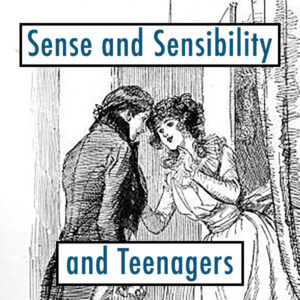My girls like to make their own videos, and this was originally done as a birthday present for my mom. A few friends deemed it too good to hide from the world, which is an opinion I am inclined to agree with. Please enjoy the following performance of “Expectations and Expectorating,” which will no doubt soon be featured on Masterpiece Theatre. The thing is, in many ways the story they came up with was not that far off the mark. Trade the dinosaurs for a catastrophic evening at a public ball and it’s spot on.
Publisher’s Note: While digging a hole in their back garden, two young girls recently discovered a long lost manuscript written by Jane Austen. Their mother was rather annoyed about the hole, but after realizing the importance of their discovery, allowed them to share what they found with the world. Here is an abridgment of the long lost novel by Jane Austen, which bore the title “Expectations and Expectoration.”
Expectations and Expectorating
A long lost tale by “Jane Austen”
It is a truth universally acknowledged that the bond of sisterly affection can never be breached. Unless a really hot guy turns up in the village.
And such was the circumstance when three sisters – Elizabeth, Annabelle, and Chelsea Tuppence – were sitting in the small breakfast room in the comfortable cottage where they lived with their poor widowed mother.
On a fine spring morning, the eldest daughter Annabelle, noted that a fine young gentleman seemed to be riding past their window.
Annabelle set down the very becoming bonnet she was trimming so that she could catch a glimpse of the visitor. He was smoldering with charm as his horse galloped across the picturesque downs, which conveniently had a phony ruined castle on the most charming of the hilltops. With all the sweetness and impulsiveness over her seventeen years, Annabelle declared, “WHOA! He IS fine!”
“Boys are yucky!” Replied Chelsea, who was quite too young to see why fine young men in blue coats were of any use at all.
The stranger begged admittance to the house and announced himself to be Mr. Ashby, the extremely handsome, wealthy, and unmarried nephew of Lady Bigginsworth, who lived down the road at Persnickety Park.
With a very low bow, Mr. Ashby asked how the ladies did.
“Much better now, thank you,” replied Elizabeth. “Would you like some tea?”
“Indeed,” came Mr. Ashby’s eager reply.
The gentleman was so affable that within just a few moments they were all chatting as if they were old friends. They talked about the most interesting subjects; the state of the roads, which books were tedious yet important, and whether or not it might rain later.
Later that evening, the two sisters unburdened their hearts to one another. Dashing about the room in a state of delighted agitation, Annabelle cried out, “I say, Elizabeth, I believe Mr Ashby is in love with me!”
“Dearest sister,” replied the elder Miss Tuppence, “I do believe you are mistaken.” Or rather, this was the reply she intended to make, but rather the words which escaped her lips were, “No, ME!”
Annabelle, with all the passion that a young, beautiful, and economically idle young woman can muster, gasped with dismay and then reasserted her claim on Mr. Ashby’s affections.
What ensued was a rare breach of sisterly affection which left neighboring farmers in no doubt that several cats must have been debating territorial boundaries.
On hearing the distressing state of affairs between the elder Misses Tuppence, Chelsea dashed up the stairs, flung open the bedroom door, and cried out for her dear sisters to stop such a disgraceful display of unsisterly behavior.
“I found this letter,” Chelsea declared, holding an enormous envelope. Inside was a confession which declared Mr. Ashby to be the basest of scoundrels. Although he lived with the appearance of a gentleman of good character, he intended to roam the countryside and steal from young ladies who might fall prey to his handsomeness and smoldering.
“He writes with a very good hand,” observed Annabelle, and Elizabeth had to own that this was true.
“But surely this must be the result of some strange misapprehension,” Elizabeth said in confusion. “For why would Mr. Ashby leave such a confession for us to find?”
“I picked his pocket,” Chelsea explained. “Mr. Ashby is a scoundrel, and he must never be welcome at Tuppence Cottage again.”
“That’s right!” the ladies heard a manly voice declare from outside. They looked out the window and saw Mr. Ashby standing below in the road. “I don’t love either one of you. I’m just here for your money! Ha ha ha ha ha haaaa!”
And with that, he galloped off down the road, having neglected to collect any of the Tuppence family fortune. But, as Elizabeth observed at a later moment of quiet recollection, Mr. Ashby’s marked traits were those of handsomeness and affability, not cleverness.
Yet Elizabeth was to be denied this satisfying contemplation for some time, as she fainted away alongside Annabelle. When the elder Misses Tuppence awoke some moments later, they began weeping. Chelsea, having been unable to move either of her elder sisters, had seated herself between them.
“Don’t worry, girls,” pronounced the youngest Miss Tuppence, “He’s a loser.”
At that very moment the sisters were alerted by a sound which resembled distant thunder. They looked again outside the window.
“My goodness, what’s that?” Elizabeth asked as she attempted to make out what fresh agitation might be coming down the road.
“It’s a a bunch of dinosaurs,” Chelsea observed.
In this moment the three young ladies put aside any past quarrels and poured into one another’s hearts the balm of sisterly affection.
“Sisters,” declared Annabelle, “Now is the time that we shall stick together more than ever before.”
There then ensured a most inconvenient row in the village of Little Wigglesworth. Elizabeth tore a great slit in her new muslin gown while battling not one but two triceratopses, and Annabelle was obliged to strike a T-Rex in the face with her best fan. Chelsea fared somewhat better, managing to befriend an obliging diplodocus and convince it to bear her about on its back. In the end, using their charm, wit, embroidery skills, and excellent moral principles, the Tuppence sisters were victorious. It must be owned, however, that their dear Mama was obliged to come downstairs to help them, which caused great agitation to her nerves.
And from that day the Tuppence sisters lived happily in their quiet little cottage in Devonshire. They had some small regrets that Mr. Ashby had been devoured by a rabid T-Rex, but found consolation in their tea parties, their musical evenings, and living such upright lives as to deny the
neighbors the satisfaction of gossip.


